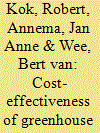| Srl | Item |
| 1 |
ID:
110718


|
|
|
|
|
| Publication |
2011.
|
| Summary/Abstract |
A review is given of methodological practices for ex ante cost-effectiveness analysis (CEA) of transport greenhouse gas (GHG) mitigation measures, e.g. fuel economy and CO2 standards for road vehicles in the US and EU. Besides the fundamental differences between different types of policies and abatement options which inherently result in different CEA outcomes, differences in methodological choices and assumptions are another important source of variation in CEA outcomes. Fourteen methodological issues clustered into six groups are identified on which thirty-three selected studies are systematically reviewed. The potential variation between lower and upper cost-effectiveness estimates for GHG mitigation measures in transport, resulting from different methodological choices and assumptions, lies in the order of $400 per tonne CO2-eq. The practise of using CEA for policy-making could improve considerably by clearly indicating the specific purpose of the CEA and its strengths and limitations for policy decisions. Another improvement is related to the dominant approach in transport GHG mitigation studies: the bottom-up financial technical approach which assesses isolated effects, implying considerable limitations for policy-making. A shift to welfare-economic approaches using a hybrid model has the potential to establish an improved assessment of transport GHG mitigation measures based on realistic market responses and behavioural change.
|
|
|
|
|
|
|
|
|
|
|
|
|
|
|
|
| 2 |
ID:
133088


|
|
|
|
|
| Publication |
2014.
|
| Summary/Abstract |
Electric vehicles represent an innovation with the potential to lower greenhouse gas emissions and help mitigate the causes of climate change. However, externalities including the appropriability of knowledge and pollution abatement result in societal/economic benefits that are not incorporated in electric vehicle prices. In order to address resulting market failures, governments have employed a number of policies. We seek to determine the relationship of one such policy instrument (consumer financial incentives) to electric vehicle adoption. Based on existing literature, we identified several additional socio-economic factors that are expected to be influential in determining electric vehicle adoption rates. Using multiple linear regression analysis, we examined the relationship between those variables and 30 national electric vehicle market shares for the year 2012. The model found financial incentives, charging infrastructure, and local presence of production facilities to be significant and positively correlated to a country×s electric vehicle market share. Results suggest that of those factors, charging infrastructure was most strongly related to electric vehicle adoption. However, descriptive analysis suggests that neither financial incentives nor charging infrastructure ensure high electric vehicle adoption rates.
|
|
|
|
|
|
|
|
|
|
|
|
|
|
|
|